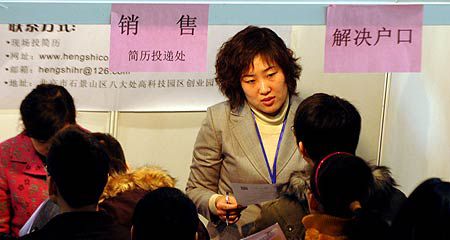各地毕业生落户政策大盘点
|
爱思英语编者按:又到毕业季,尽管就业情况不容乐观,但毕业生在选择职位时还是会优先考虑户口问题。今天我们为你盘点了几个热门就业城市的落户政策,研究一番再做决定吧! What you need to know about hukou The permanent household registration system, or hukou, is always an issue for college graduates when job hunting. It determines to what extent one can enjoy the social welfare of the city one works in, and affects property investment and even car purchases. In the following article, hukou policies in various cities are explained as a helpful reference for students.
Beijing A hukou in the country’s capital is no easy catch. Even if you graduated with a bachelor’s degree from a Beijing-based university, you cannot get a local hukou if you are over 24 years old, according to the latest policy issued by the municipal government. Those who join the civil service at a ministerial level will automatically get a Beijing hukou. Students who join high-tech or manufacturing companies in the Tongzhou, Yizhuang or Shunyi development areas are not subject to quota limitations and can get a hukou if eligible. (www.bjld.gov.cn/) Tianjin Graduates who work for private companies based in either Tianjin or Xi’an for two years following their graduation can apply for a local hukou in the respective city. (www.tj.lss.gov.cn) Wuhan Earlier last month, Wuhan lifted a limitation on the number of graduates who can settle down in the city. Graduates who are employed or start a business in Wuhan within two years after their graduation can move their hukou to the city. Graduates from much needed majors, including automobiles, steel, petrochemical engineering and logistics, can transfer their hukou to Wuhan before starting to look for a job. To attract new talent, the city has incorporated graduates into the basic housing security. Employers can help graduates apply for basic housing, rents for which are 30 percent cheaper compared with the market price. (www.whrsj.gov.cn) Shanghai According to the Shanghai municipal government, graduate applicants for a local hukou must have obtained 425 points or above in the CET4 exam and provide a certificate of their computer skills. In order to apply for hukou on behalf of their employees, companies must have a registered capital of more than 1 million yuan. In addition to these hurdles, Shanghai has been operating a “points system” since 2004. Applicants gain points by meeting certain requirements or having certain skills, much like the points system for immigrating to another country. For instance, graduating with a much needed major or from a “211 project” institution, or working in a key industry offers extra points. Once they reach the necessary number of points, applicants are on their way to becoming official Shanghai residents. (www.12333sh.gov.cn) Chengdu Chengdu canceled its limitation on the number of graduates who can move to the city years ago. Graduates can apply for a local hukou using their graduation certificate, diploma and labor contract, according to Wang Wei, deputy director of the Chengdu Human Resources and Social Security Bureau.(www.cdhrss.gov.cn) Xiamen Years ago, Xiamen launched its talent reservoir project. Students with a master’s degree can apply for a local hukou, regardless of whether they are employed or not. Those with a bachelor’s degree in automation, automobiles, mechanics, construction engineering or aviation can also get a hukou before looking for a job in Xiamen. (www.xmhrss.gov.cn) Shenzhen In order to attract talent to the special economic zone, Shenzhen issued a special policy for designated majors (including economics, law, literature, chemical engineering, and material engineering) from China’s top 38 institutions (such as Peking University, Tsinghua University, and Renmin University of China) whose graduates can apply for a hukou immediately after graduating. There are no further conditions, except for a minimum CET 4 exam score of 420. (www.szhrss.gov.cn) |









